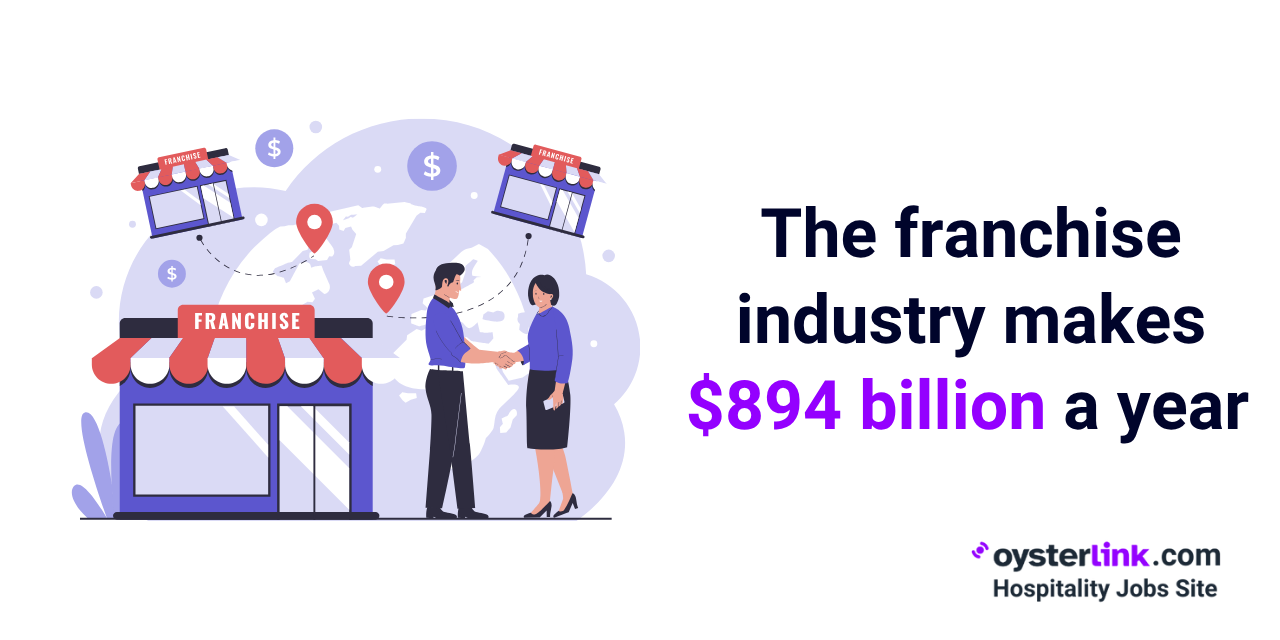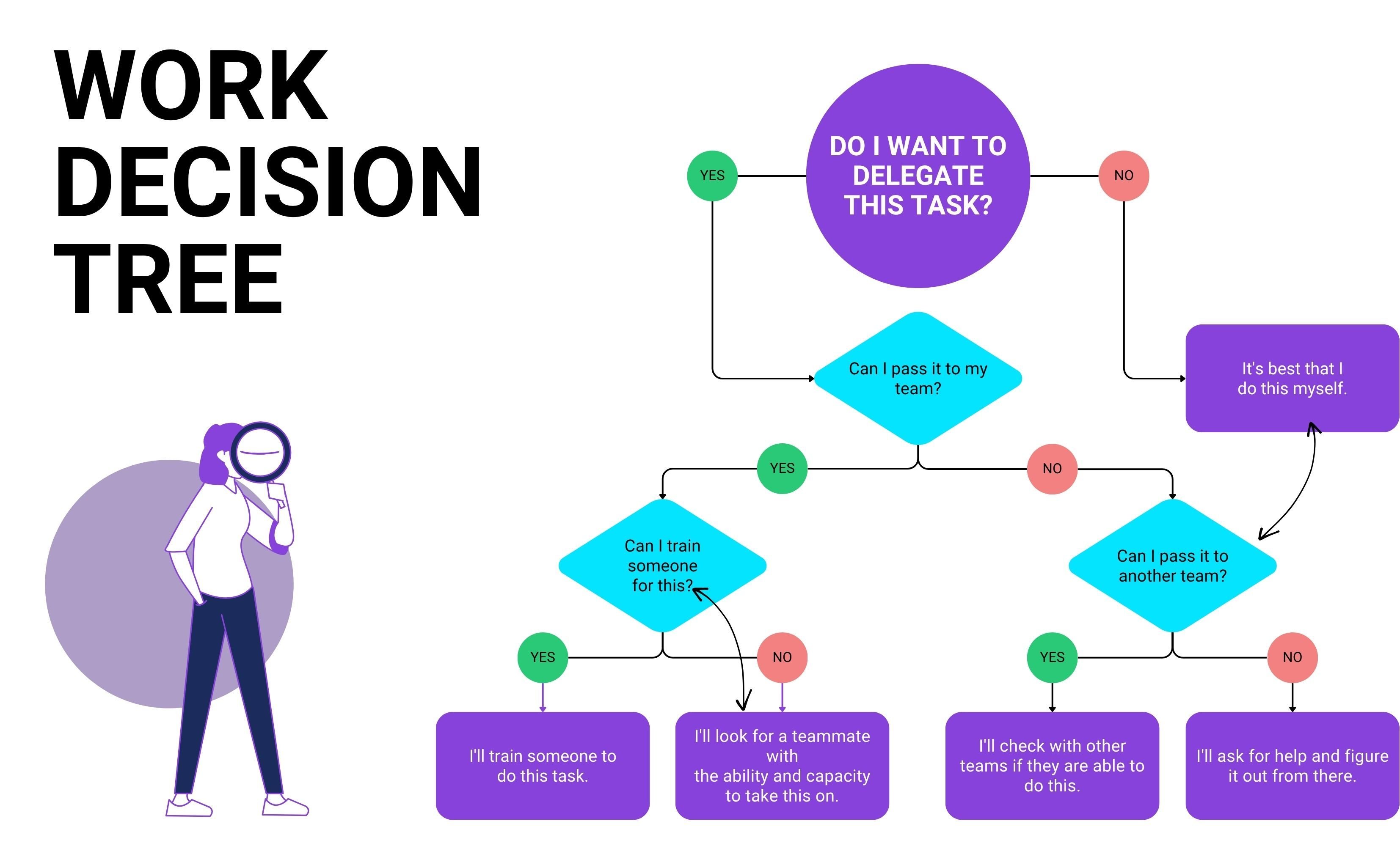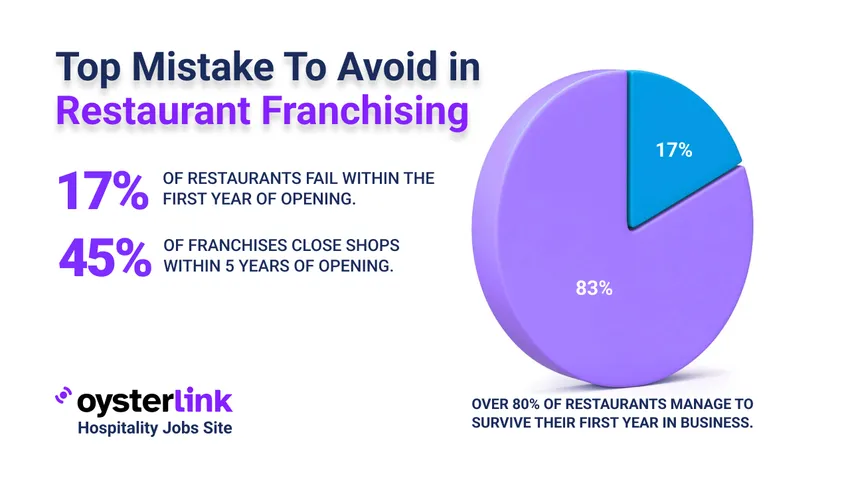The #1 reason restaurant franchises fail isn’t bad food, bad locations, or bad luck. It’s launching before your systems are ready.
In this article, we’ll cover the biggest mistake that sinks franchises, what real franchise readiness looks like and how to protect your brand at scale.
How To Franchise a Restaurant Successfully
The franchise industry generates nearly $894 billion in economic output across 821,000 locations nationwide.
The hospitality sector alone grew from $4.39 trillion to $4.7 trillion in just one year—a staggering 7% growth rate that has restaurant owners everywhere seeing dollar signs.
Most food franchises are fast-food chains (about three out of every four). The rest include bakeries, food stores, sit-down restaurants, and dessert shops, which together make up less than 30%.
But here's what the success stories don't tell you: for every McDonald's or Subway, there are countless independent restaurant concepts that crashed and burned during franchising attempts.
The wreckage isn't just financial—it's reputational, legal, and deeply personal for owners who watched their life's work get diluted beyond recognition.
The difference between the winners and the casualties? It's not the concept, the market timing, or even the initial investment. It's preparation.
And the mistake that kills more franchise dreams than any other is insufficient preparation before launch.

What Real Preparation Looks Like When Franchising a Restaurant
The process starts with what franchise experts call "systemization"—the unglamorous but critical work of documenting every single thing that happens in your restaurant.
Franchises with solid systems in place can handle 80% of franchisee questions through documented playbooks alone.
The research shows that this kind of standardization actually boosts sales and franchisee satisfaction.
.png)
The more you’ve documented, the fewer surprises down the road—and the easier it is to scale without losing what made you special in the first place.
Three Essential Pillars To Franchise a Restaurant Without Disaster
Operations that scale without you
Your restaurant needs to run like clockwork whether you're there or not.
This means creating standard operating procedures so detailed that a new employee could follow them perfectly on day one.
These procedures need to capture not just what to do, but why it matters and how to adapt when things go wrong. The best franchise systems include decision trees for common scenarios.

Brand protection that actually protects
Registering your trademark is just the start. Real brand protection goes deeper—it means defining the intangible elements that make customers choose you over the competition.
A strong franchise agreement should clearly state not only what franchisees can’t change, but what they must preserve to maintain the brand experience.
Legal foundations that anticipate problems
Smart restaurant owners invest heavily in franchise attorneys who understand the unique challenges of food service operations.
Yes, legal fees can reach $40,000 or more, but consider the alternative: one badly structured franchise agreement can cost you hundreds of thousands in litigation and brand damage.
.png)
The most sophisticated franchise agreements proactively address common issues. They outline procedures for menu changes, quality enforcement, termination grounds, and dispute resolution.
The Counter-Intuitive Truth About When To Franchise a Restaurant
Here's where most restaurant owners get it wrong: they think franchising is about growth, so they rush to market as quickly as possible.
The smartest franchisors do the opposite. Before offering a single franchise opportunity, they typically open two or three company-owned locations to stress-test their systems.
Only 17% of restaurants fail in their first year. But the ones that succeed long-term aren't just surviving; they're building systems that can be replicated consistently.
The Real Economics Behind Franchising a Restaurant
The financial reality of franchising is more complex than most restaurant owners anticipate.
Initial costs often top $100,000, covering legal work, system setup, training, and second-location testing.
The QSR industry brings in $295B yearly and is set to top $316B in 2024—but you’ll need to be ready to claim your share.
Most franchisors don't see meaningful returns until their third to fifth franchise location.
The first couple of franchisees essentially subsidize the learning process as you refine systems, fix documentation gaps, and develop more effective training programs.
The reward potential is substantial, but it's not passive income.
Successful franchisors describe their role as part consultant, part quality control specialist, and part relationship manager.
.png)
How To Know When You're Ready To Franchise a Restaurant
The moment you realize you're truly franchise-ready isn't when you've completed all the documentation.
It's when you stop thinking like a restaurant owner and start thinking like a systems creator.
Because without that shift in mindset, rushing to market with incomplete systems doesn’t just threaten your growth, it puts everything you’ve already built at risk.









Loading comments...